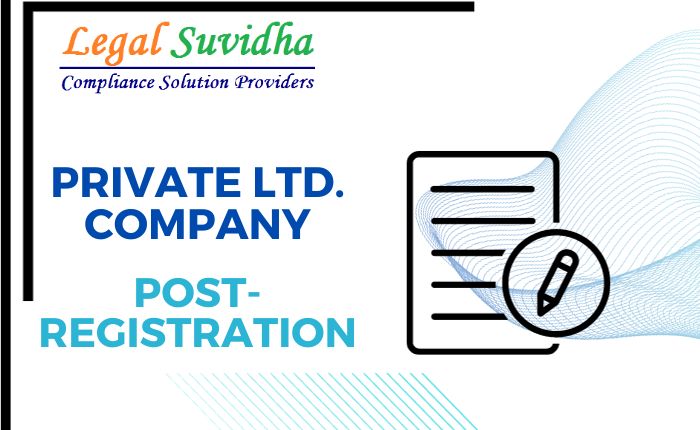When you start a company in India, you have to follow certain rules even after it’s officially set up. These rules are called post incorporation requirements, and they’re essential to make sure your business operates legally. If you don’t follow them, both you and your company can face fines and penalties.
A Private Limited Company in India is a type of business where the owners are responsible for the company’s debts only up to the amount they’ve invested in the company. These companies can’t sell shares to the general public.
Now, let’s look at the ten things you need to do after you’ve set up your Private Limited Company:
- Bank Account: Post incorporation requirements include opening a dedicated bank account for your Private Limited Company. Conducting business under an individual’s name is not permissible, as the company is considered a distinct legal entity.
- Accountancy Records: Section 128 mandates that every company maintain accurate accounting records that reflect the financial status of the business accurately. Accounting must be done on an accrual basis, and the double-entry system must be employed.
- Business Seal: The company must display its name at every location where it conducts business. This name should be in the language most commonly spoken at that location. Additionally, the company requires a seal with its name engraved on it, as well as letterheads containing essential information about meeting post incorporation requirements for official documents
- Share Certificates: Share certificates for shareholders must be issued within 60 days of the establishment date is a critical step in meeting post incorporation requirements. In cases involving the issuance of more shares, the duration extends to 60 days from the date of allotment.
- First Board Meeting: Within 30 days of incorporation, the company must hold its first Board of Directors meeting as per Section 173(1) of The Companies Act, 2013. Directors can participate in this meeting online or via video conference.
- Statement of Interest: According to Section 184(1) of the Companies Act, 2013, every director must disclose their ownership interest during the first board meeting, a key aspect of post incorporation requirements. Any changes to these disclosures must be communicated at the first meeting of the financial year. If there is an independent director, they must certify their compliance with independence standards during the first board meeting.
- Registered Office: Within 30 days of incorporation, a registered office must be established for the business, as per Section 12(1) is vital to meet post incorporation requirements. This address serves as the official point of contact for various authorities, and any changes must be reported to the registrar within 30 days of the company’s establishment.
- Statutory Registers: The company is required to maintain statutory records at its registered office and keep them up-to-date. Neglecting this obligation can result in penalties.
- Business Formation Certificate: Within 180 days of establishment, the company should receive a certificate of business formation is a crucial step in meeting post incorporation requirements. Directors must submit a statement confirming that each subscriber has paid the full amount due on their shares.
- Initial Auditor Appointment: The Board of Directors (BOD) must appoint the first auditor within 30 days of company registration, unless it is a government agency, in accordance with Section 139(1). Alternatively, the members can select the auditor at a special general meeting held within ninety days of registration. The first auditor’s term concludes at the end of the first annual general meeting.
In conclusion, post incorporation requirements are crucial for Private Limited Companies in India. These rules are there to make sure everything is done correctly, and it’s a good idea to get professional advice to help you follow them properly.
If You have any queries then connect with us at [email protected] or [email protected] & Contact us & stay updated with our latest blogs & articles










